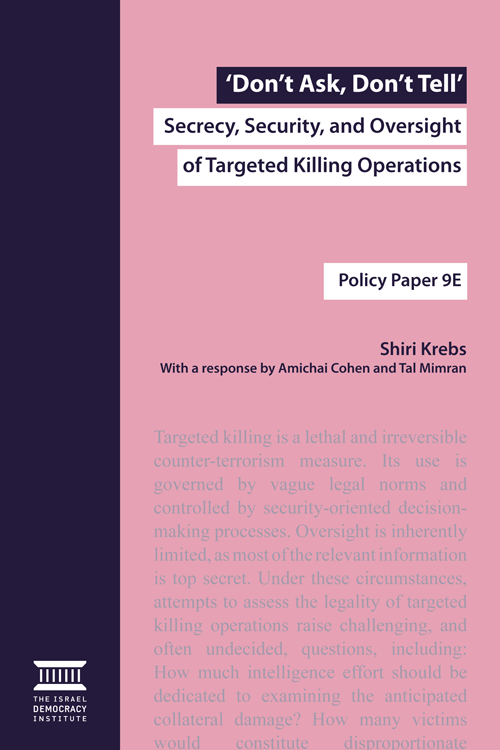Don’t Ask Don’t Tell
Secrecy, Security, and Oversight of Targeted Killing Operations
- Written By: Shiri Krebs, Prof. Amichai Cohen, Adv. Tal Mimran
- Publication Date:
- Number Of Pages: 115 Pages
- Center: The Amnon Lipkin-Shahak Program on National Security and the Law
- Price: 45 NIS
Targeted killing is a lethal and irreversible counter-terrorism measure. Its use is governed by vague legal norms and controlled by security-oriented decision-making processes.
Oversight is inherently limited, as most of the relevant information is top secret. Under these circumstances, attempts to assess the legality of targeted killing operations raise challenging, and often undecided, questions, including: How much intelligence effort should be dedicated to examining the anticipated collateral damage? How many victims would constitute disproportionate collateral damage, when set against the prevention of a large scale terror attack? And, given the inherent limitations of intelligence information, how certain must one be that the targeted area is free of innocent bystanders?
While exploring these and other questions, this policy paper sheds light on the targeted killing decision-making process. It highlights some of its weaknesses, proposes concrete solutions to these problems, and advocates a restrictive targeted killing policy, one that protects civilians from the ravages of both terrorism and counter-terrorism.
Shiri Krebs is a law and international security fellow at the Stanford Center on International Security and Cooperation (CISAC) and a doctoral candidate at Stanford Law School. She was formerly a research assistant at the Israel Democracy Institute.
This policy research paper was produced under the auspices of the Israel Democracy Institute’s Amnon Lipkin Shahak Program on National Security and Democracy, headed by Prof. Mordechai Kremnitzer, Prof. Yuval Shany, and Admiral (retired) Ami Ayalon.
The policy paper includes a response by Amichai Cohen and Tal Mimran.
Abstract
Secrecy, Security, and Oversight of Targeted Killing Operations
I. Introduction
II. Defining ‘Targeted Killing’ Operations
III. The Normative Legal Frameworks that Apply to Targeted Killings
IV. The Main Challenges
V. Conclusion: A New Model for Scrutinizing Targeted Killing Operations
Response
Amichai Cohen and Tal Mimran
I. Introduction
II. The Geographical Scope of the Conflict and the Application of IHL
III. Analysis of Direct Participation of Civilians in Hostilities
IV. The Shehadeh Commission
V. Efficacy of the Lethal Targeting of Active Terrorists
VI. Conclusions
Some Thoughts, Clarifications, and Answers to Cohen and Mimran’s Response
Shiri Krebs
I. The Geographical Scope of the Battlefield
II. Extra-Territorial Application of IHRL 110
III. The Principle of Precaution in Attack 111
IV. The Quantum of Proof 112
V. Efficiency of Targeted Killing Operations

